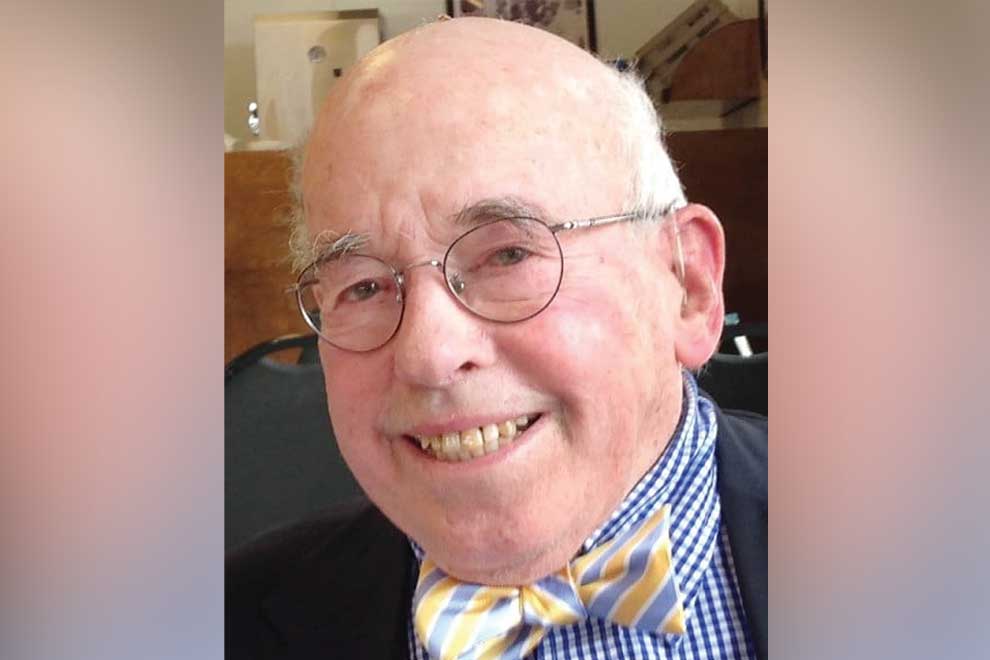
Journalist Richard Dudman, one of the few Westerners to meet Khmer Rouge leader Pol Pot, seen in a family photo from 2015. Photo supplied
Richard Beebe Dudman, a prolific American journalist perhaps best known in the Kingdom for being among the few reporters to have met former Khmer Rouge leader Pol Pot – and for having doubted the scale of atrocities under his regime until late in life – died on Thursday at the age of 99.
A reporter for the St Louis Post-Dispatch for most of his over 75-year-long career, Dudman often found himself in the thick of history, from reporting on United States President John F Kennedy’s assassination to covering conflicts and revolutions around the world.
Born on May 3, 1918, in Centerville, Iowa, he first began covering the Vietnam War in 1968, and in 1970 – along with Elizabeth Pond of the Christian Science Monitor and Michael Morrow of Dispatch News Service International – tried to drive from Saigon to Phnom Penh to report on the escalating covert war in Cambodia. The trio, however, were abducted along the way by Vietcong fighters, who accused them of being CIA spies.
“If we get out of this alive, we’ll have a hell of a good story,” Dudman told his colleagues at the time.
Released six weeks later on a roadside and left to hitchhike back to Saigon, Dudman described his captivity in his 1971 book Forty Days with the Enemy.
But perhaps his most defining professional experience came in 1978, when along with Elizabeth Becker of the Washington Post and Scottish economist Malcolm Caldwell, he secured a meeting with Pol Pot. They were the first western writers to gain access to Cambodia since the Khmer Rouge takeover in 1975, and Dudman’s reporting would receive accolades, despite later proving to be controversial for having been relatively soft on the brutal regime.
Recalling the experience of the trip at the Khmer Rouge tribunal in 2015, he said that a “feeling of frustration” prevailed as it was “really impossible” to get answers to any questions. Minded by Khmer Rouge officers, the group was tightly controlled and given a tour of the country, including several worksites and communes, which he suspected painted a rosier view of the regime amid reports of mass killings and atrocities. Internal regime documents from the time show the Khmer Rouge viewed Dudman with suspicion, often referring to him as an “imperialist”, DC-Cam Director Youk Chhang noted yesterday.
The 1978 interview with Democratic Kampuchea’s “brother number one” turned out to be a one-sided affair, which Dudman described in a 2015 article for the Post-Dispatch. “He spoke in a quiet monotone,” he said of Pol Pot, whose handshake he found unnerving. “He spoke in Cambodian, Foreign Minister Ieng Sary put the Cambodian into French, and another official translated into English. Before getting to our questions, Pol Pot launched into a diatribe against the Vietnamese,” he wrote, adding: “We tried to break in with questions, but he ignored them and rolled right on.”
However, Dudman did take one of the few photographs of the secretive dictator.
The night following the interview, a gunman broke into the house where the group was staying. Dudman found himself face-to-face with the assailant, and took cover in his room, dodging bullets. The motivation for the attack, in which Caldwell was killed, never became clear, nor was the identity of the perpetrators ever revealed.
Dudman was later criticised by Becker for being less critical of the regime than her in his reporting in which he described the country as “one huge work camp, but its people clearly were not being worked to death or starved to death”.
Dudman’s work in Cambodia received recognition at the time, including from the US government, and it wasn’t until the Vietnamese liberation in 1979 that Becker’s accounts would appear vindicated.
Yet Dudman retained his scepticism of mass atrocities and, in a George Polk Award-winning editorial for the New York Times in 1990, he questioned whether Pol Pot was a mass murderer while saying that Vietnam was “the real threat” to Cambodia.
Despite her criticism of Dudman’s conclusions following the 1978 trip, Becker yesterday remembered her former colleague fondly.
“On our trip to Democratic Kampuchea he was very professional and a solid, friendly colleague especially during that horrible night when we were attacked by Khmer Rouge assassins who killed Malcolm Caldwell. Dick and I disagreed profoundly about what we witnessed in that trip – he was willing to give Pol Pot the benefit of the doubt – but we remained friends,” she wrote in an email.
It wasn’t until his 2015 court testimony that Dudman admitted his reporting and subsequent editorial on the Khmer Rouge had not been critical enough and that he had come to believe the evidence supported mass murder.
“Since then, I have read a great deal about what went on under the Pol Pot regime and I’ve talked to many sources about it too,” he told the court. “And I doubt if I would have written this story knowing what I know today.”
Additional reporting by The New York Times
Contact PhnomPenh Post for full article
Post Media Co LtdThe Elements Condominium, Level 7
Hun Sen Boulevard
Phum Tuol Roka III
Sangkat Chak Angre Krom, Khan Meanchey
12353 Phnom Penh
Cambodia
Telegram: 092 555 741
Email: [email protected]










